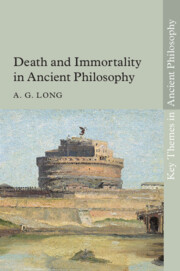
-
Select format
-
- Publisher:
- Cambridge University Press
- Publication date:
- May 2019
- June 2019
- ISBN:
- 9781316091562
- 9781107086593
- 9781107451568
- Dimensions:
- (228 x 152 mm)
- Weight & Pages:
- 0.47kg, 240 Pages
- Dimensions:
- (229 x 152 mm)
- Weight & Pages:
- 0.36kg, 242 Pages
You may already have access via personal or institutional login- Series:
- Key Themes in Ancient Philosophy
Book description
Death and immortality played a central role in Greek and Roman thought, from Homer and early Greek philosophy to Marcus Aurelius. In this book A. G. Long explains the significance of death and immortality in ancient ethics, particularly Plato's dialogues, Stoicism and Epicureanism; he also shows how philosophical cosmology and theology caused immortality to be re-imagined. Ancient arguments and theories are related both to the original literary and theological contexts and to contemporary debates on the philosophy of death. The book will be of major interest to scholars and students working on Greek and Roman philosophy, and to those wishing to explore ancient precursors of contemporary debates about death and its outcomes.
Contents
Metrics
Altmetric attention score
Full text views
Full text views help Loading metrics...
Loading metrics...
* Views captured on Cambridge Core between #date#. This data will be updated every 24 hours.
Usage data cannot currently be displayed.
Accessibility standard: Unknown
Why this information is here
This section outlines the accessibility features of this content - including support for screen readers, full keyboard navigation and high-contrast display options. This may not be relevant for you.
Accessibility Information
Accessibility compliance for the PDF of this book is currently unknown and may be updated in the future.


